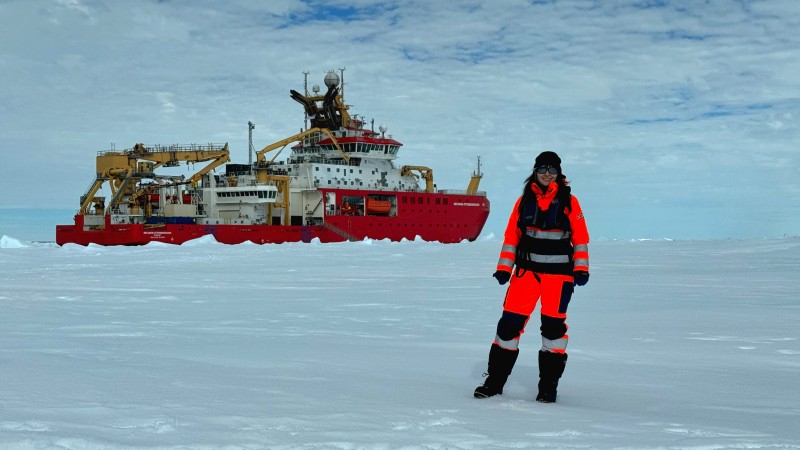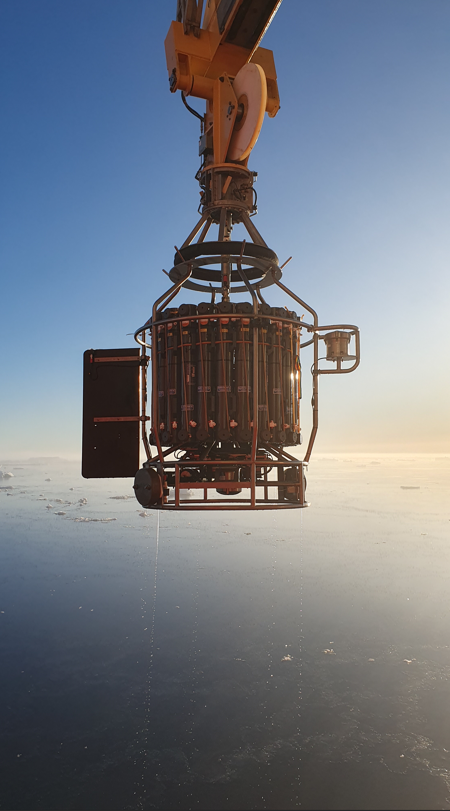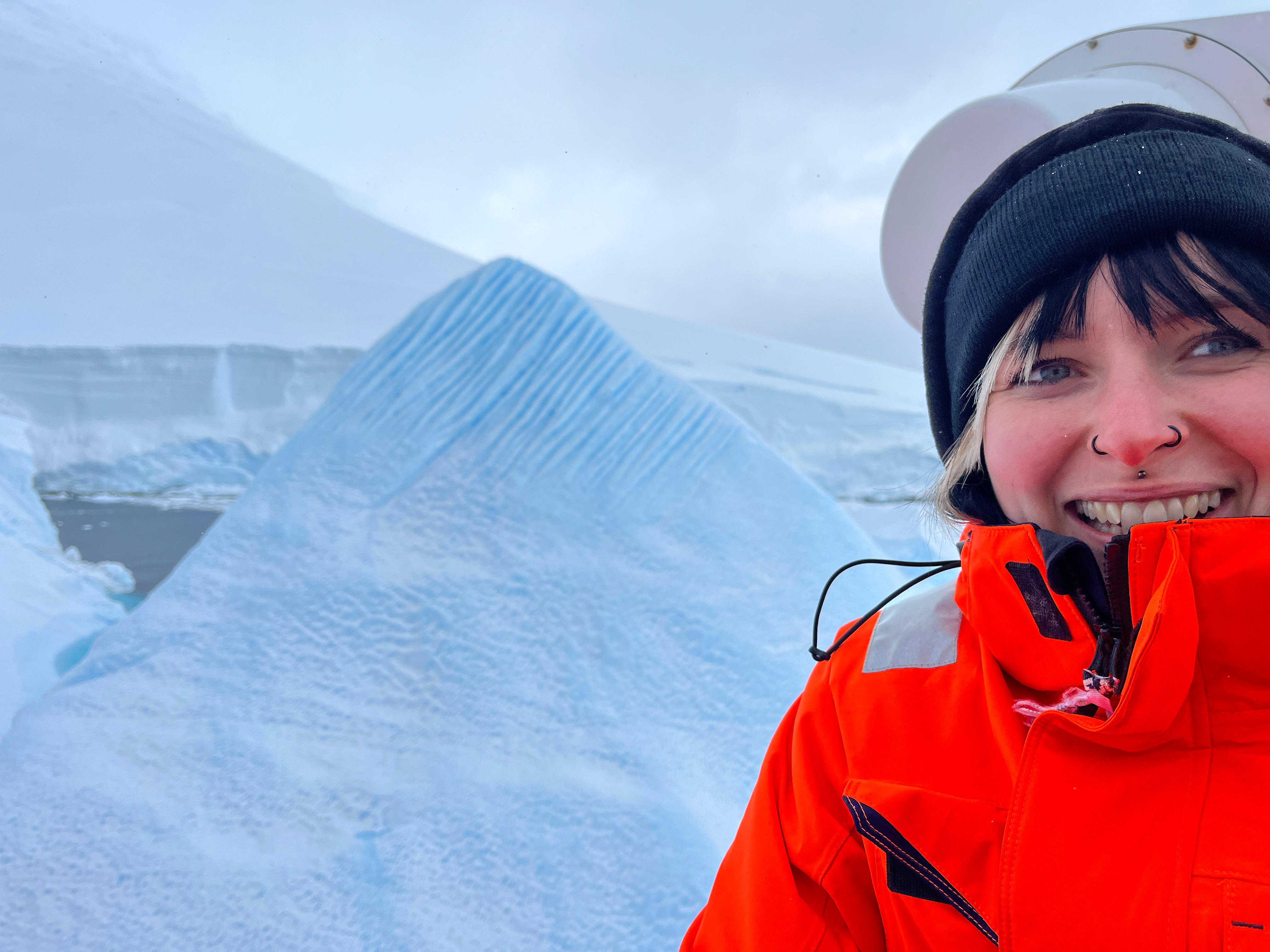Chasing after the Fate of Carbon in the Antarctic Weddell Sea
Chiara Krewer
University of Leeds

In early January 2024, me and 32 scientists from different institutes within the UK arrived in Punta Arenas at the southern tip of Chile and boarded the RSS Sir David Attenborough (SDA) ahead of the PICCOLO research expedition. Just a day later, we were all standing on deck waving good-bye to the port and civilisation with a big smile on our faces. Our direction: The Weddell Sea.
PICCOLO (Processes Influencing Carbon Cycling: Observations of the Lower limb of the Antarctic Overturning) is part of the RoSES research program funded by NERC. The aim of the 52 day expedition is to trace the fate of carbon in the Southern Ocean and to investigate the biological and chemical interactions of carbon with the atmosphere, ice, and the surface water, before carbon is descending to the ocean’s deeper depths. Armed with the newest technology, and a science-team from many different disciplines, we were ready to collect data from one of the most remote and least accessible place on Earth.

As part of the Trace Metal geochemical team, my role on the ship was to split into two projects: Together with Angie Milne and Simon Ussher (University of Plymouth), we collected water samples the SDA clean laboratory ready to be analysed for iron and other trace metals once back onshore. Why iron you may ask? The C cycle is deeply connected with photosynthesis, a biological process that requires not only carbon dioxide and light, but also nutrients. And while major nutrients like nitrate and phosphate are rich in cold waters, iron can only be found in very small concentrations. Understanding the sources and mechanisms that supply iron to the ocean therefore is crucial. However, the small seawater concentration of iron comes with challenges: Since the SDA is basically a big red metal box, special care has to be applied when collecting and processing samples to avoid any kind of contamination from metals from the ship. Water samples from different depths were therefore collected with a titanium-frame CTD rosette, equipped with 24 trace-metal free samples bottles, and then processed in the ultraclean laboratory.
For the second project, I supported Will Homoky and Alastair Lough from the University of Leeds in the collection and measurement of radium in water samples collected from the CTD rosette. The short lifespan of Radium atoms and the predictable decay rates can be used to track the movement of water masses and combined with iron, sources and pathways of iron sources to the ocean can be investigated. While contamination during the Radium collection process is less likely (since there is very little radium around), the low concentration of Radium in the water requires the filtration of big volumes of water (120 L) to retrieve enough Radium atoms to carry out the measurement on board. A work that requires quite a lot of physical strength!
While our days were very much centred on the CTD-rosette operations, a lot of different science activities were taking place as well. One of my highlights of the expeditions were the work we carried out on an ice-floe. On a glorious sunny, wind-still day, we walked off the ship onto a large ice-floe where we drilled holes through the ice to collect both ice cores and water samples from beneath the sea ice. Under the watchful eyes of very nosy Emperor penguins!
Strong winds, currents and unexpected sea ice cover forced us to constantly change plans and directions – flexibility, creativity and adaptation to the unknown is definitely the most useful tool in our toolbox. Yet, the research cruise has been a full success, not only due to high expertise of all the people involved but also because of the positive attitude nourished by the kindness and relentless enthusiasm of the science team and the ship’s crew. It was such a privilege for me to join this multidisciplinary team for the PICCOLO project so early on in my research career. This expeditions did not only expanded my practical skill set, it also gave me the opportunity to get to know scientist from different backgrounds, and create a bond on a professional as well as personal level that is unique. I am beyond grateful to the leaders of the project as well as for the Challenger Society of Marine Science who made my involvement in this cruise possible – an unforgettable experience that will shape my future career.

Profile
I am a fourth year PhD student at the University of Leeds, working with Prof Simon Poulton. I am funded through the NERC Panorama DTP, looking into water column reconstruction and ocean-climate interactions during deoxygenation events in deep time using a combination of geochemical multi-proxy approach (iron, phosphorous and redox-sensitive trace metals) and biogeochemical modelling. In previous projects, I focussed on the behaviour of iron and trace metals in modern aquatic systems.
Latest News
Marine Data Management, Governance and the MEDIN toolset
The Marine Environmental Data and Information Network (MEDIN) and OceanWise are delighted to invite you to attend our popular free online training workshop: ‘Marine Data Management, Governance and the MEDIN toolset’ on the 19th – 23rd of May 2025.
Workshop on the contribution of UK Arctic Ocean science to the International Polar Year 32/33
12:00 11th June – 16:00 12th June 2025: NOC Southampton (In-person with online option): Registration deadline 16th May
REGISTER HERE
Pre-meeting questionnaire (open to all)
The purpose of this workshop is for the UK Ocean Science community to discuss and then draft a prospectus document outlining the priority Arctic research questions the community would like to address during the run up to, throughout and beyond the International Polar Year 32/33. Additionally, to identify what unique strengths and technologies the UK has to help fill these knowledge gaps.
The second day of the workshop will be dedicated to writing groups, one for each of the priority research questions identified - from both the pre-meeting questionnaire (HERE) and day one discussion. By the end of the meeting, each group will have produced draft text and sourced supporting figures for the prospectus.
Post meeting, the draft will be opened for comments and suggestions from everyone, regardless of whether they were able to attend the workshop or not. It will then be shared with UK funders (UKRI, FCDO, DSIT, ARIA) and potential international programmes with whom we would like to collaborate (e.g. Arctic 2050, Norway). It will form a basis from which wider integration with terrestrial, atmospheric and cryosphere communities can be built, e.g. at the UK Arctic Science Meeting in September in Northumbria.
To ensure balanced community and ECR representation, and to ensure that the size of the writing groups is efficient and effective, if the number of registrations from individual institutes becomes overwhelming, we may contact individuals or teams and ask that each institute selects a smaller number of individuals to attend in-person. Please wait for confirmation of in-person attendance before finalising travel arrangements.
The workshop will be open to hybrid attendance and contributions on both days.
Challenger Society Council Position Vacancy
The Challenger Society for Marine Science (CSMS) are pleased to announce an exciting opportunity to support the next generation of ocean scientists and innovators. CSMS are looking for a new Council member to fill the Student Travel Awards and Stepping Stones Portfolio. The successful applicant will administer the travel and research grants available for Early Career Researchers.
The role involves:
- Receiving applications for the two schemes and responding to applicant inquiries
- Soliciting and compiling input from the rest of the Council for assessing the applications
- Communicating with successful and unsuccessful applicants for the two schemes
- Working with the Honorary Treasurer on allocating funds to successful applicants
- Following up with award winners on their reporting requirements
- Attending Council meetings four times a year (in person or online) and contributing to discussions and decision making for CSMS
The usual term for Council members is three years.
For more information about the CSMS Council, please follow this link: https://www.challenger-society.org.uk/The_Council
For more information about our Early Career Researcher grants and awards, please follow this link:
https://www.challenger-society.org.uk/Stepping_Stones
and
https://www.challenger-society.org.uk/Travel_awards
If you are interested in applying or have any questions regarding the role, please contact kathen@bas.ac.uk
